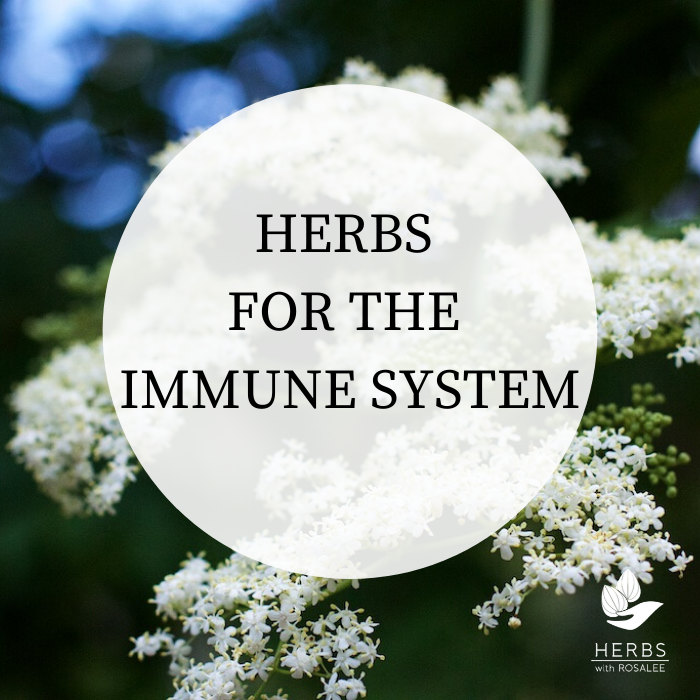Get weekly tips, recipes, and my Herbal Jumpstart e-course! Sign up for free today.

Herbs for Immunity
Share this! |
|
Herbs for immunity are powerful allies in building our immune systems. This is often our best defense against upper respiratory illnesses. This article looks at herbs that are known to be beneficial to the immune system, as well as herbs that can address specific symptoms such as coughs, fevers and more.
In my younger years I had a very weak immune system and, thanks to herbs and other practices, I rarely get colds or the flu now. I’ve also worked with many clients and students on this subject. One of my most popular online courses is Herbal Cold Care.
It
may surprise some people that herbs not only have a long history of
successful use but they are also studied extensively. For more
information or a closer look at the studies I mention, see the citations at the end of the article.
Immune System: Mindset and Preparedness Matters
Choosing habits and activities that support your immune system daily is the best way to improve your immune system health. It's long term strategies that will make the biggest positive impact!
Below are some of my suggestions for preventing upper respiratory infections.
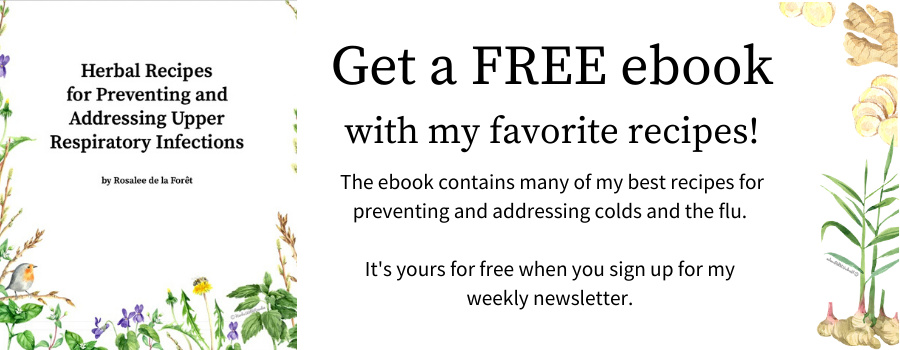
Prevention
Hygiene and Avoidance
Washing your hands, elbow bumps, avoiding touching your face, as well as avoiding people via unnecessary travel and staying home if possible, are all being covered heavily in the news and via health agencies and social media networks. Standing at least six feet apart and wearing a face mask can further prevent you and others from getting sick.
Avoidance and basic hygiene like washing your hands for 20 seconds is important!
However, what’s not being discussed as readily are ways you can actually build or modulate your immune system.
While I certainly can’t promise that the following herbs and practices will make you immune to anything that comes your way, my personal experience tells me that building your immune system has positive impacts for keeping you healthy and for reducing severity of symptoms during an illness.
Herbs for Immunity and Preventing Illness
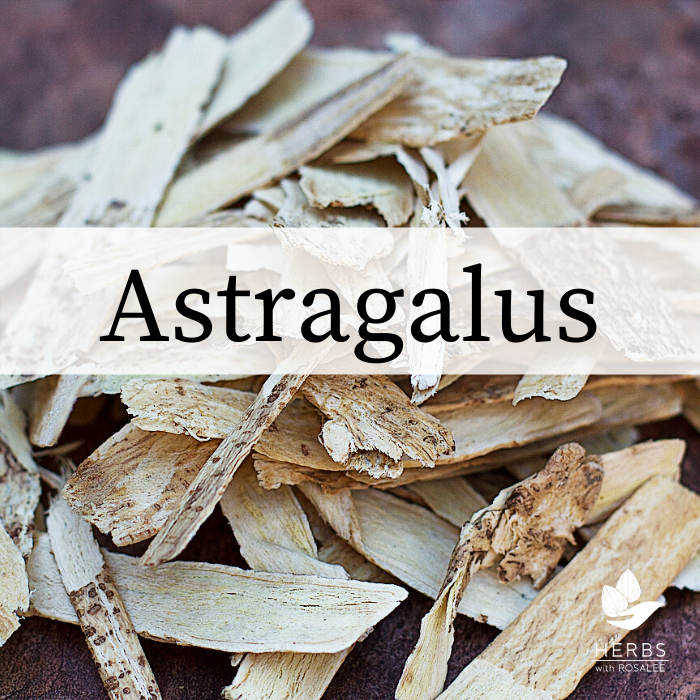
Astragalus (Astragalus propinquus, syn A. membranaceus)
Astragalus root
is originally from China and is now used extensively by western
herbalists. For many years astragalus has been my favorite herb for
building and modulating the immune system. I regularly take it during
the winter months.
This Chinese herb is used in many formulas
for upper respiratory viruses, including Jade Screen Formula (used as a
preventive). I often combine it with other herbs in chai spiced teas.
Despite astragalus’ popularity and extensive history of use there
aren’t a lot of studies on the whole root. From limited human clinical
trials and from in-vitro studies, we know that astragalus increases the
white blood cell count, decreases viral replication, and stimulates the
production of T killer cells.1,2
Astragalus works best when taken in higher amounts for a long period of time. I recommend 15-30 grams of the dried root daily. (Get the e-book for an astragalus recipe.)
Codonopsis (Codonopsis pilosula)
Codonopsis root is another Chinese herb. It’s commonly used as a substitute for ginseng due to its lower price. Codonopsis can stimulate the immune system, strengthen the lungs and has moistening qualities.3 I recommend 15-30 grams per day. Lately I’ve been combining it with astragalus in my daily chai spiced teas. Like astragalus, this is something to take regularly over a period of time.
Elderberry (Sambucus nigra, S. cerulea)
Recently some herbalists have raised concerns that elderberry can potentially stimulate what is commonly called a cytokine storm or cytokine release syndrome (CRS).
Concerns about elderberry, as far as I can tell, are based on a 2001 study involving healthy volunteers and the popular product Sambucol. In that study researchers concluded, “Sambucol might therefore be beneficial to the immune system activation and in the inflammatory process in healthy individuals or in patients with various diseases.”4a
More recently, a 2016 study showed that a formula based on elderberry inhibited harmful cytokines in people who had atherosclerosis.4b
Elderberry is a very popular herb and is currently used extensively for the prevention of upper respiratory infections. I know of zero actual cases of elderberry stimulating a cytokine storm or CRS. I’m happy to revise my statements if a clear correlation is found; however, I’ve seen elderberry work too many times to now brush it aside because of a hypothesized risk.
Of course, if you have concerns about elderberry there are other immunity herbs to choose from.
Lots of studies have been done showing elderberry benefits for preventing and reducing the symptoms of upper respiratory viruses.
One study followed 312 airline passengers flying overseas from Australia. Half were given an elderberry preparation and the other half got a placebo. Those taking the placebo had slightly more occurrences of a cold or flu during their trip than did those taking the elderberry.
More significantly, those taking the elderberry who did get a cold reported a marked reduction of cold duration and severity compared with those taking the placebo.5
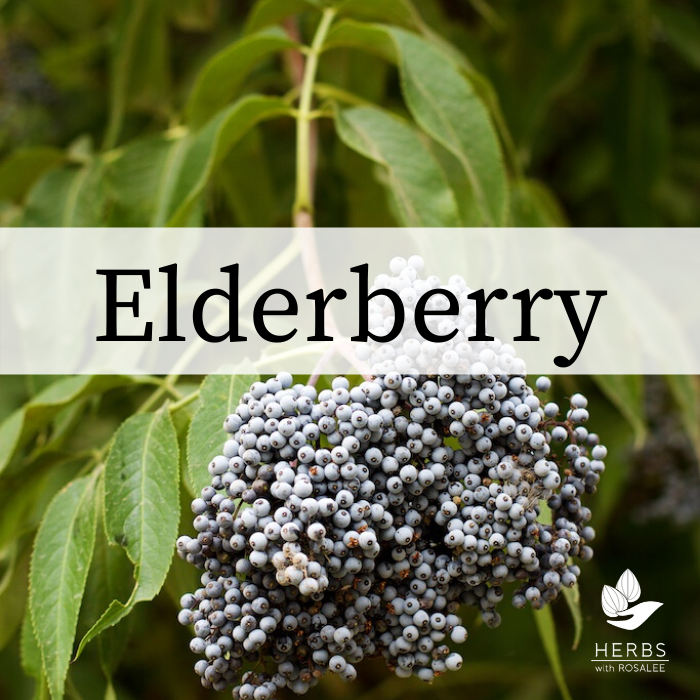
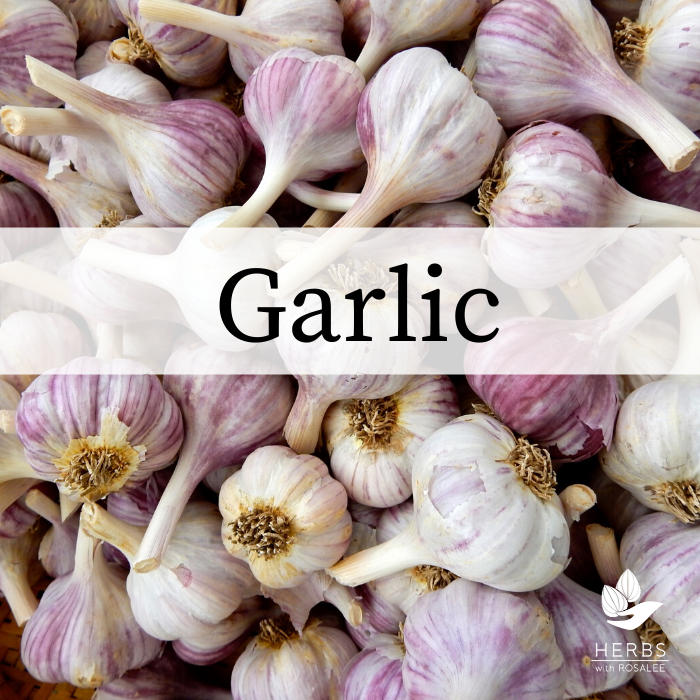
Garlic (Allium sativum)
Studies have shown that garlic
increases the natural killer cells of the immune system, reduces
inflammatory cytokines (chemical messengers of the immune system) and
can reduce the severity of colds and the flu.6
One study compared a group of children taking long-releasing garlic
extracts with another group of children taking a pharmaceutical drug in
the hopes of preventing upper respiratory infections. Those taking the
garlic had a two- to fourfold reduction in sickness compared with a
control group taking a placebo. Incidentally, the pharmaceutical
performed no better than the placebo.7
The
garlic studies used aged garlic. I prefer raw garlic. It’s effective,
cheap and local! Win-win-win. I mince or crush up 1-2 cloves and add
that to my veggie breakfast in the morning. (Get the e-book for more
garlic recipes.)
Mushrooms
Many mushrooms can help to build your immune system. I take reishi frequently simply for general health. Reishi has many immune system benefits. For example, one study demonstrated that β-glucans from reishi (G. lucidum) increase the frequency of immune system cells in the peripheral blood.7a
I’ve written about turkey tails here. I also take MyCommunity by Fungi Perfecti daily. Cordyceps is another wonderful ally for the immune system. One randomized double blind study showed that those taking cordyceps had enhanced NK cell cytotoxic activity vs. those taking a placebo.7b Another human clinical study concluded that cordyceps is "safe and effective for enhancing cell-mediated immunity of healthy male adults".7c
Other Ways to Support Immune System Health
In addition to herbs for immunity there are many other ways to support general immune system health.
Eating a nutrient-rich diet, maintaining ideal vitamin D levels, being active, spending time outside, and joy and laughter have all been shown to have positive effects on the immune system.
Herbs for immunity excel at addressing the symptoms of upper respiratory viruses. I see them working best when they are used in a way that supports your own amazing and powerful immune system. Herbs aren’t there to magically erase symptoms; instead they are partners, something able to give you a helping hand as your body dances with the pathogens.
Fever
Fevers are a beneficial immune system response. Immediately taking steps to reduce a fever through over-the-counter drugs is harmful and could lead to a prolonged illness.8 Unless a fever becomes severe, or the person with the fever is exhibiting severe symptoms, fevers do not need to be lowered.
The most important consideration during a fever is rest and hydration. Water, tea and electrolyte blends can all be used to ensure hydration.
Fevers, as beneficial as they may be, are still uncomfortable. Herbs can help reduce that discomfort and they can also help support the fever process.
Herbs for Immunity for Hot Fevers
When you feel hot, restless, have aches and pains but aren’t sweating, the following herbs help to bring circulation to the skin, relax tense muscles and promote sweating.
Elderflower (Sambucus nigra, S. cerulea)
Elderflower
excels at supporting the fever process. I also like this herb as a tea
at the first sign of illness as it can potentially shorten the duration
(similar to elderberries). (Get the e-book for the recipe.) This may be because elderflowers are known to have strong immunomodulating properties.8a
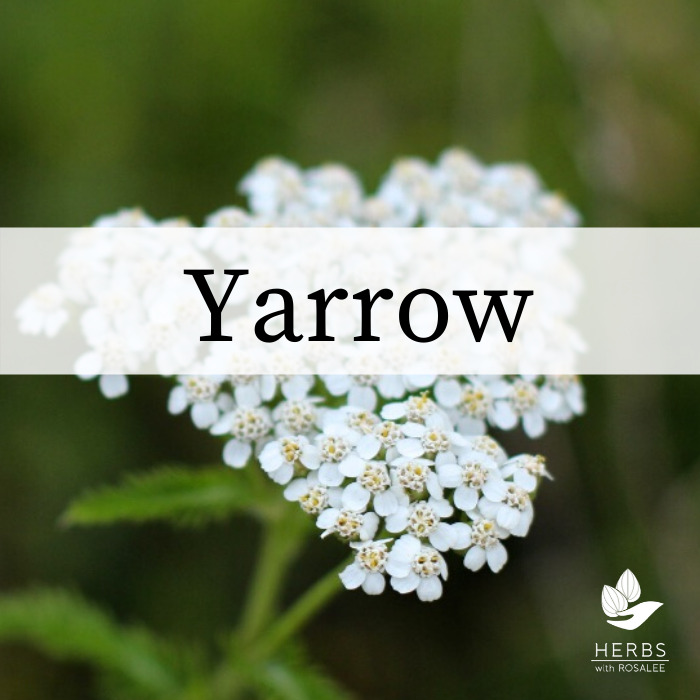
Chamomile (Matricaria chamomilla)
Chamomile
is my favorite herb for fevers associated with crankiness, headaches
and general aches and pains. I recommend a strong infusion; it will be
bitter, but also very effective at soothing irritability and promoting
restful sleep.
Yarrow (Achillea millefolium)
Yarrow
is a premier herb for supporting the fever process. An old western
herbal formula that remains popular today consists of a yarrow and
elderflower formulation. (Get the e-book for the recipe.)
Herbs for Immunity for Cold Fevers
When you feel chilled the following herbs can help to warm you up. (Also, bundling up, sauna and hot showers and baths can be helpful).
Ginger (Zingiber officinale)
If you could choose only one herb to use during a cold or the flu, ginger might be the one, especially when there are signs of coldness and dampness such as shivering or a thickly coated tongue. Many different complaints during an upper respiratory system infection can be treated with ginger. Ginger can warm you up from the inside, which is helpful for the onset of a cold or flu when you feel chilled and are shivering. Relieve a sore throat with ginger tea or a spoonful of ginger-infused honey; ginger’s antimicrobial properties help prevent further infection. I also like ginger as a fresh juice. Fresh ginger is the best choice as an antimicrobial. Dried ginger is more heating in nature and is good for feelings of coldness.
Cayenne (Capsicum annuum)
Karta Purkh Singh Khalsa and Robyn Landis wrote in their book Herbal Defense, “You can treat a cold very effectively with nothing but chiles if you can get enough down.” Cayenne is an internal heating herbal medicine and one of several long-celebrated ways to stop a cold in its tracks. (Other methods include sweating therapies such as saunas or hot baths.) You can add cayenne to meals or make an easy tea by adding small amounts of the powder to hot water and adding lemon and honey. (Get the e-book for the recipe).
Oregano and Thyme
Oregano and thyme are very similar garden herbs that are both antimicrobial and warming in nature. I prefer these as a short-infused tea taken consistently throughout the day.
Dry Cough
When working with someone who
has a cough it’s best to choose the herb for the type of cough rather
than simply a “cough herb”. While many over-the-counter cough medicines
simply focus on stopping a cough, herbs can be more artfully called
upon.
For
example, with dry coughs the goal is often to moisten the tissues, thus
stopping the dryness and irritation that is causing the cough. For
congested or damp coughs we want to thin the mucus so it’s easier to
expel.
The following are some examples of herbs to use for different coughs.
For even more information see my article on home remedies for coughs here.
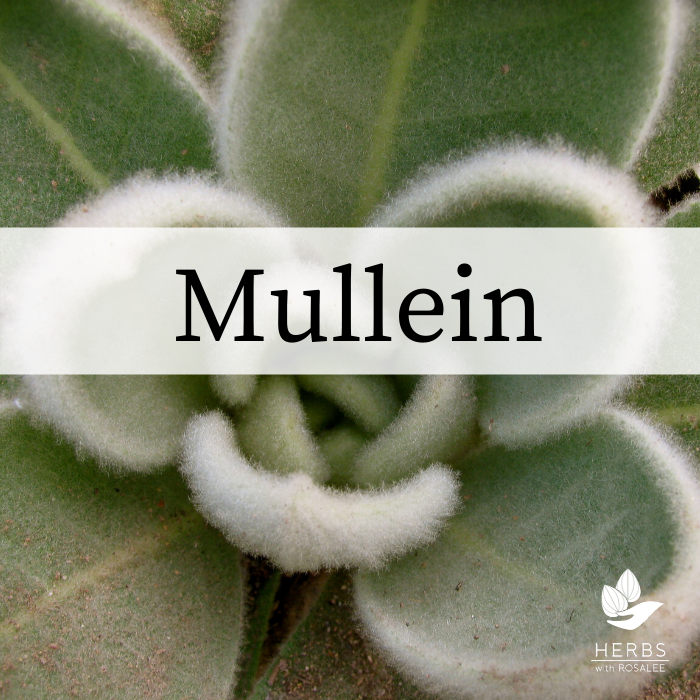

Demulcent Herbs for Dry Coughs
Mullein (Verbascum thapsus)
Long used to support general lung health, mullein leaves can benefit people with weak lungs (such as those with asthma) or those under acute lung stress such as a cold or flu or even pollution or wildfire smoke inhalation. I recommend a strong tea that has been filtered through a cloth (to avoid ingesting the potentially irritating little hairs that cover the leaves).
Plantain (Plantago major, P. lanceolata)
You know that type of dry, hacking cough that seems endless and oh so painful? The one you typically get at the end of a cold or flu or from inhaling small particles such as dust or smoke?
Plantain soothes hot, dry, and spasmodic coughs. It moistens the lungs and cools the heat, thus relieving the irritation causing the cough. I prefer plantain as a tea for coughs, but it can also be used as a tincture.
Marshmallow and Mallow (Althaea officinalis or Malva neglecta, Malva spp.)
The many different mallows out there are wonderfully demulcent and a favorite for soothing dry irritated throats and coughs. I often use it as a simple or added to other herbs such as plantain and mullein.
Violet (Viola spp.)
Violets are a soothing and moistening herb as well as a gentle lymphatic. If you have access to lots of violets, then a strong violet tea can be a soothing way to relieve a dry cough. One double-blind randomized clinical trial with children aged 2 to 12 years found that violet syrup could help the coughs of children with intermittent asthma.9
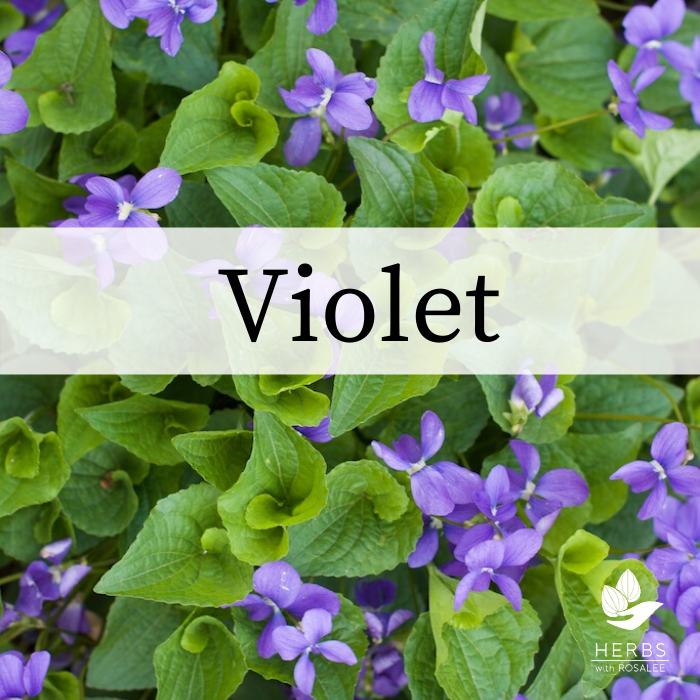

Anti-Spasmodic Herbs for Dry Coughs
The second way to address those dry spasmodic coughs are to use anti-spasmodic herbs to quell coughing. I especially like this technique to stop ongoing spasms or when a person lays down and immediately starts coughing. (Note, coughs that are accompanied with a lot of congestion are best addressed with stimulating expectorant herbs, rather than cough suppressant herbs. Otherwise you run the risk of trapping excess mucus in the lungs.)
Lobelia (Lobelia inflata)
Lobelia can be taken as a tincture or vinegar extract in drop dosages (increasing slowly as needed) to stop spasmodic coughs. Relief is generally achieved immediately. Taken in excess lobelia may induce vomiting.
Valerian (Valeriana officinalis)
Valerian is a powerful anti-spasmodic herb that also promotes sleep. I like to take it in increasingly larger dosages until I get the results I’m looking for. Occasionally some people become more hyper when taking valerian as opposed to relaxed. Valerian can be taken as a tea or tincture (I prefer tincture).
Cramp bark (Viburnum opulus)
Cramp bark can relieve muscle spasms including those from a dry cough. It can be used as a decoction or tincture. When used as a decoction I like to combine it with yummy-tasting herbs like cinnamon and ginger to offset the taste.
Stimulating Expectorant Herbs for Congested Coughs
When there is a lot of congestion in the lungs we rarely want to stop the coughing reflex. Basically your body is coughing in order to rid your lungs of a potentially harmful buildup of mucus. We don’t want to hinder that! Instead, we can use stimulating expectorant herbs to help thin the mucus and make it easier to expel from the lungs. If there is congestion but it is especially thick or dry, the demulcent herbs listed above (as well as hydration) can also help.

Many of my favorite herbs for lung congestion are the same herbs we used for cold fevers above. These warming herbs also thin mucus. Garlic, ginger, cayenne, thyme and oregano are all effective.
Elecampane (Inula helenium)
Elecampane root is one of my favorite herbs for lung congestion. It is antimicrobial, has a strong pungent and bitter taste, and noticeably improves lung function and relieves congestion. You can slice up the fresh root and infuse it into honey. Or you can make a syrup out of the dried root. You can see my recipe for the syrup here.

Looking for More Information?
If you have further questions about the herbs for immunity mentioned in this article then please see my linked extensive monographs which contain a lot of information.
Most of the herbs in this article, as well as recipes, can also be found in my books, Alchemy of Herbs and Wild Remedies.
If you have personal health questions please consult a medical and herbal practitioner. I don’t give health advice unless I have done a complete intake process and I am not currently seeing clients.
Citations for Herbs for Immunity
Click to show/hide.
Rosalee is an herbalist and author of the bestselling book Alchemy of Herbs: Transform Everyday Ingredients Into Foods & Remedies That Healand co-author of the bestselling book Wild Remedies: How to Forage Healing Foods and Craft Your Own Herbal Medicine. She's a registered herbalist with the American Herbalist Guild and has taught thousands of students through her online courses. Read about how Rosalee went from having a terminal illness to being a bestselling author in her full story here.
